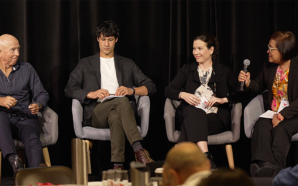While Sr Nathalie Becquart XMCJ, described as the most influential woman in the Vatican, was in the Diocese of Parramatta in February this year, renowned journalist Geraldine Doogue took the opportunity to lead a discussion of what synodality might look like in Australia.
Along with Sr Nathalie, Australia’s Ambassador to the Vatican, Chiara Porro, CEO of Caritas Australia, Kirsty Robertson, and Chair of St Vincent’s Health, Paul McClintock, came to the Mary MacKillop Chapel in the Bethany Centre to talk about some of the practical applications of synodality in the Australian context. “This puts ‘flesh on the bones’ of the process that Pope Francis has initiated,” said Geraldine, referring to the Synod of Bishops taking place in 2023 and 2024.
Sr Nathalie told the group that she had heard a common comment from many people in local Churches around the world. “So many people have said that it is the first time the Church is asking my voice, is asking me to contribute,” she said. “This is leading people to realise ‘yes, the Church is not only the bishops, but all of us, and we want to continue’.”
Paul, who chairs an organisation with 80,000 workers, felt this concept could be challenging. “There is a thing in the back of our minds that says, ‘do we really have permission?’ ‘Are we allowed to do this?’,” he observed. “Synodality is hugely important in telling us, ‘It’s time for us to rethink our leadership role’.”
When Kirsty Robertson travels to some of the most remote, poverty-stricken and powerless parts of the world, she has seen people with t-shirts about the Synod of Bishops. “This Synod is sparking conversations around the world,” she said, adding that people she encounters are now saying “I have a voice” for the first time.
Sr Nathalie addressed the controversial nature of synodality head-on, noting it ranges from anxiety amongst bishops and priests who may be worried about losing their role, to women who feel they may not be heard. “So, we really need to understand and to speak also about our fears and anxiety,” she said. At the same time, with the call for the Church of the third millennium being synodal, she said, the central question is “are we led by our fears and anxiety or are we led by what we have discerned as a Church?”
Paul has experienced this in his work in the Catholic health space. “A lot of people are finding discernment uncomfortable because you don’t know what the answers are.”
For Ambassador Porro, the concepts of synodality align with the work of the Australian government, particularly around recognising marginalised groups, and the plight of the people of the Pacific who are being most impacted by climate change, but who are rarely heard.
Sr Nathalie summed up how intrinsic diversity is to the Catholic Church. “What I think the Catholic Church is learning is how to become a global universal Church, with, and through the diversity of the local Churches,” she said. “The vision of the synodal Church is a Church of local Churches.
“From the beginning, the Catholic Church is built on diversity. We have four gospels to tell the same story, but not coming from the same communities. We shouldn’t be afraid of diversity.”
This article was originally published in the 2023 Lent and Easter | Autumn edition of the Catholic Outlook Magazine. You can pick up your copy of the magazine in parishes and offices across the Diocese of Parramatta now or you can read the digital version here.







